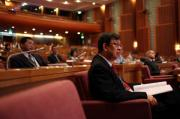
Practical information
The objective of this seminar is to try and outline the tendencies, processes or determinants that could affect climate negotiations between COP 15, in Copenhagen, and the upcoming conference in Cancún, and possibly alter its results: the increasing and increasingly visible impacts of climate change, the rise of new leaders or coalitions in the negotiations, and the development of alternative and possible competitive forums of governance. Such reflections will enable speakers and participants to give a first prospective analysis of the upcoming negotiations in Cancún.
The presentations and videos of the speeches are available below.
Other events

Paris Naval Conference 2026: Naval Rearmament and Operations in Contested Waters
This fourth edition of the Paris Naval Conference (CNP), bringing together high-level military, industrial, and academic speakers, will address the challenges associated with general naval rearmament and naval operations in increasingly contested environments.





